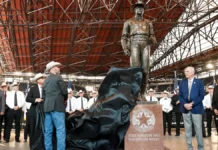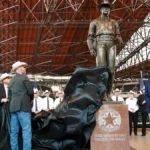
In a moment that should have triggered national soul-searching, the conversation around South Africa’s white farmer crisis was instead drowned in predictable outrage—mostly directed at the man bold enough to bring it up: President Donald Trump. During a tense Oval Office meeting with South African President Cyril Ramaphosa, Trump didn’t mince words. He showed video footage of political rallies where “Kill the Boer” chants were belted out by energized crowds. The reaction from the media? Not horror or concern—but pearl-clutching over the delivery.
Trump’s presentation centered on a deeply uncomfortable topic: the targeting of Afrikaner farmers through brutal violence, often with no justice for the victims. For years, reports of farm invasions, torture, and murders have trickled through alternative media and foreign outlets, while mainstream coverage in the West either downplayed or ignored it altogether. This silence broke when Trump issued an executive order earlier this year welcoming 59 Afrikaner refugees, citing “racially motivated land expropriations and ethnic targeting.” The media howled. But why?
FULL VIDEO: President Trump confronts South African President Ramaphosa on “white genocide” in South Africa.” pic.twitter.com/KyMKDokfvN
— Townhall.com (@townhallcom) May 21, 2025
To his credit, Ramaphosa didn’t lash out. Instead, he tried to downplay the extremism. The chants? According to him and many of his defenders, they’re symbolic—remnants of South Africa’s anti-apartheid past, not literal calls to violence. But that explanation begins to unravel in the face of mounting evidence. Farmers are being murdered. Some are tortured. Others are ambushed at night in what can only be described as terroristic assaults. Whether the chant is symbolic or not, the killings are real. And it’s hard to ignore the racial context when the targets are almost uniformly white landowners.
Enter the press. As soon as Trump played the footage, major networks like CNN launched into damage control mode, framing the chants as misunderstood historical expressions and questioning the legitimacy of the refugee claims. “No evidence,” some declared, as if the graves of slain farmers weren’t evidence enough. The narrative quickly shifted—not toward investigating the violence, but toward dismantling the credibility of the man bringing it to light.
🚨CNN: Chants about killing white people in South Africa need “historical context.” pic.twitter.com/OFZfUrvn8v
— Townhall.com (@townhallcom) May 21, 2025
And that’s precisely the problem. The horror of political violence becomes less important than the optics of who is sounding the alarm. The media’s refusal to grapple seriously with what’s happening to these farmers doesn’t just do a disservice to the victims—it undermines any claim to moral consistency. If these were members of another ethnic minority being slaughtered in politically unstable conditions, would there be such reluctance to call it out?
Adding gasoline to the fire is South Africa’s proposed land seizure bill, which enables the government to expropriate land without compensation. Proponents frame it as long-overdue reform; critics say it’s legalized theft with dangerous racial overtones. It’s hard not to see the connection: when politicians stir resentment and promise land redistribution while mobs chant about killing white farmers, the risk of escalation becomes very real.
Hi @NBCNews! What happened here? pic.twitter.com/V3DyzPnRkm
— Jack Poso 🇺🇸 (@JackPosobiec) May 21, 2025








